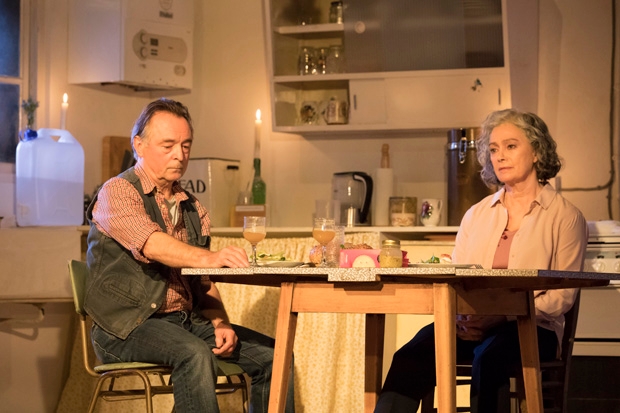What if? is the engine of every great story. What if the toys came to life when their owner left the room? What if the prince’s uncle killed the king, seduced the queen, and stole the crown? Lucy Kirkwood asks: what if an elderly atomic physicist volunteered to take charge of the team decommissioning a stricken nuclear power plant in order to spare the lives of younger workers? Quite a complicated set-up. The play takes an hour to reach its starting point. First it feels like an oldies love triangle with a post-apocalyptic twist. We’re in a farmhouse near the site of a nuclear disaster. Rose, a wrinkly beauty, arrives unexpectedly and is greeted by fun-loving Hazel. Both are retired physicists who worked at the plant but haven’t met for 38 years. They catch up on babies, affairs, careers etc. Frosty Rose is unmarried and childless. Blousy Hazel is retired with grandchildren. Her loudmouth husband, Robin, arrives and they all get plastered on home-made plonk. Robin and Rose, it emerges, had a torrid affair lasting many years and the slow-moving script asks us to imagine that Rose has arrived to claim Robin back.
There are other puzzles in this tangled plot. Why are Robin and Hazel still living slap-bang next to the UK’s version of Chernobyl? Odder still, Robin makes daily trips into the radiation zone to care for some animals. He must have so many gamma rays zinging off his skin that he could get a job as a lighthouse. Finally, the story begins and Rose beseeches her old pals to sacrifice themselves alongside her because ‘it’s not fair’ on the young people ‘with their whole lives ahead’. But Rose can’t compel them to join her mission, and the play dwindles into a series of poorly linked actions that feel like a struggle for a proper ending. There’s a kiss, a dance, a vengeful slap, a hair-pulling episode, a haemorrhage from the mouth, a sudden electricity surge. Flooded drains burst across the kitchen floor. Phone calls are made to taxi-drivers and distressed off-spring. There’s yoga too. Synchronised yoga even. But none of it takes the story anywhere satisfying.
It’s a pity because Kirkwood has a talent for dialogue and psychological observation. The characters are full of amusing thoughts on ageing, parenthood, female rivalry and domestic trivia. ‘Personally,’ says Rose, ‘I find salad deeply depressing.’ That got a huge laugh. There are some lively stabs at aphorism. ‘Retired people are like nuclear power stations. They like to live by the sea.’ Robin complains that ‘my middle-aged spread has gone entirely to my ego’. Later he declares, ‘Young men get impotent rage, old men get incontinent belligerence.’ Not great, perhaps, but aphorists are allowed the odd miss. The characters are a mite too fond of mounting the pulpit. ‘If you’re not going to grow, don’t live,’ says Hazel, three times. And the chick-lit symbolism is overdone. The ghostly bells of a sunken church are heard to chime at sunset on the incoming tide. ‘I did hear the bells,’ says Rose, ‘ringing out across the shingle.’ Did
you, dear?
The ensemble work is fine. Francesca Annis is persuasively arid as the suicidal do-gooder, Rose. And Deborah Findlay brings a lot of warmth to Hazel, the sermonising gran. Ron Cook delivers his usual Cockney-sparrer routine, which he adjusts, very slightly, to the role of a heart-throb nuclear physicist. However, I bet these actors would prefer to play a rip-roaring comedy about the sex lives of old folks (which Kirkwood could easily script) rather than this convoluted tale of eco-angst and earth-mother cant. ‘We’ve got miles and miles of coast,’ worries Hazel. ‘Why aren’t they thinking about wind power?’ No actor should have to spout that sort of Monbiotic drivel. Lighten up, Lucy, and give us a laugh.
‘It’s going to be a flop,’ announced my 10-year-old-son as he fingered his free Aladdin programme and sipped a glass of complimentary mango juice. Two classy actors dominate this high-energy panto. Charismatic Vikki Stone wears an updated witch’s costume with a moss-green robe and a burly head-dress to emphasis her height and authority. She explained the plot for the benefit of the beginners: penniless Aladdin is destined to marry wealthy Princess Jasmine against her dad’s wishes. ‘But how can this happen?’ she asked. ‘Cancel Brexit!’ yelled someone in the crowd. Widow Twankey, a raspingly camp James Doherty, runs her launderette as a political arena. Pulling a string of numbered garments from the washing-machine, she feigned horror when ‘Article 50’ arrived. She stuffed it back out of sight and the audience gasped with relief.
By the end my son had changed his mind. ‘Nine out of ten,’ he pronounced. Not more? ‘Always room for improvement,’ he said sniffily. ‘Is there any more mango juice?’







Comments